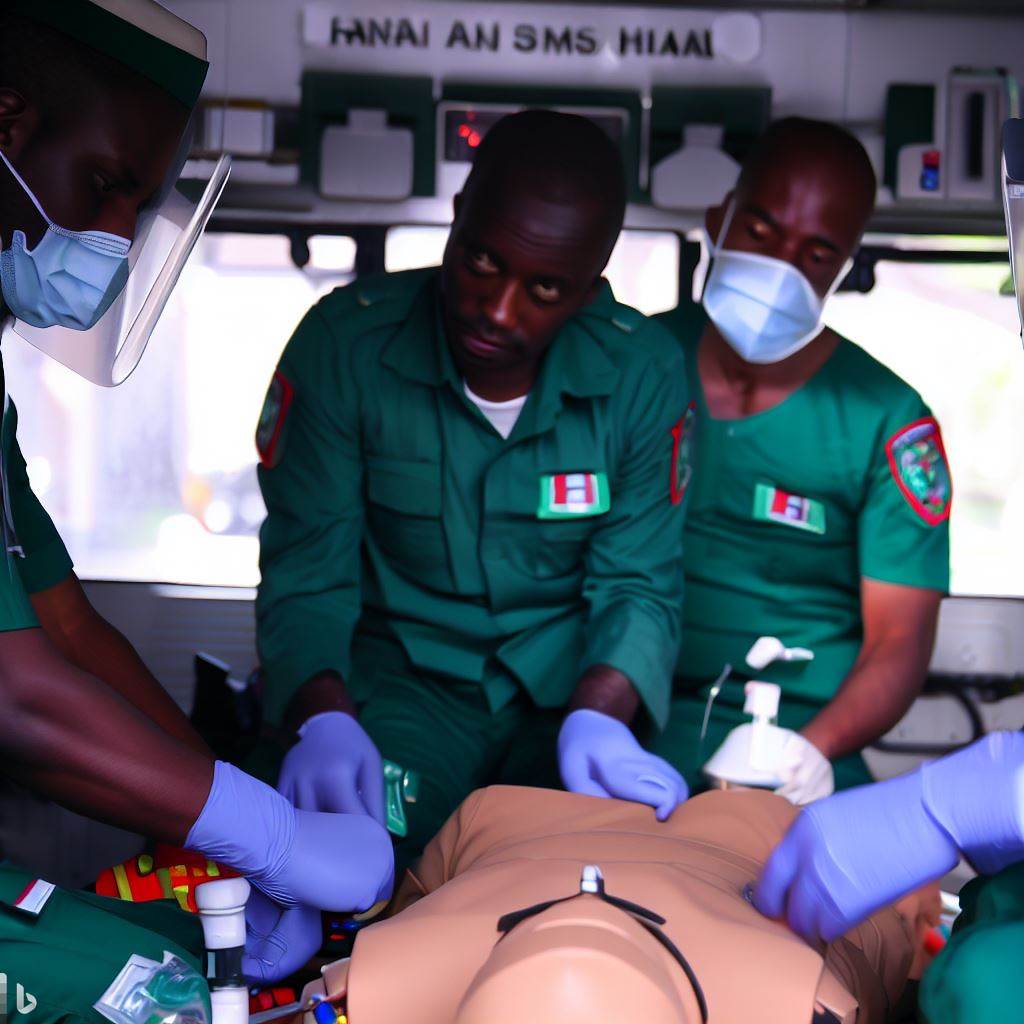Introduction
A day in the life of a Nigerian paramedic is filled with unpredictable challenges and rewarding experiences.
By sharing personal stories, we gain valuable insights into their work and understand the complexities they face.
Personal stories are crucial in comprehending the realities of being a Nigerian paramedic. They provide a glimpse into the daily encounters, emotions, and difficulties these professionals go through.
Through these narratives, we can empathize with their struggles and appreciate the impact of their work on individuals and communities.
Personal stories also shed light on the resource limitations and systemic issues faced by Nigerian paramedics.
They help us understand the resilience and determination required to provide emergency medical care in a challenging environment.
Furthermore, these stories highlight the critical role that Nigerian paramedics play in saving lives and providing timely medical interventions.
They often operate in high-pressure situations and must make split-second decisions that can make a difference between life and death.
By sharing their personal stories, Nigerian paramedics inspire others to pursue this noble profession and contribute to improving healthcare in the country.
These narratives serve as a call to action, urging society to strengthen support for paramedics and invest in better resources and training.
In essence, personal stories of Nigerian paramedics provide us with a deeper understanding of their work, challenges, and contributions to society.
They allow us to appreciate their resilience, recognize the importance of their role, and advocate for improvements in the healthcare system.
Background on Nigerian Paramedics
Nigerian Paramedics play a crucial role in providing emergency medical care in the country. They are trained professionals who respond to medical emergencies and provide on-site treatment.
To become a paramedic in Nigeria, individuals must undergo rigorous training and obtain the necessary qualifications. Paramedics are required to have a minimum of a high school diploma or its equivalent.
They must also complete a certified paramedic training program, which includes both theoretical and practical components.
Transform Your Career in Nigeria
Discover unmatched expertise with our personalized Career Consulting service. Navigate Nigeria’s job market with a strategy tailored just for you.
Get StartedAfter completing their training, paramedics must pass a licensing examination to practice legally in Nigeria.
Paramedics are an integral part of the emergency medical services (EMS) system in Nigeria. Their primary role is to assess patients’ conditions and provide immediate medical interventions.
Paramedics are trained to stabilize patients, manage trauma, administer medications, and perform life-saving procedures.
They work in ambulances, responding to emergency calls and transporting patients to medical facilities.
Paramedics collaborate with other healthcare professionals, such as doctors and nurses, to provide comprehensive care.
In addition to emergency response, paramedics also play a crucial role in public health education and disaster management.
They educate communities about emergency preparedness, first aid, and injury prevention.
During disasters, paramedics are at the forefront, providing immediate medical assistance and organizing relief efforts.
Read: The Impact of COVID-19 on Paramedics in Nigeria
Morning Routine
Nigerian paramedics start their day by waking up early, usually before the break of dawn. They understand the importance of being prepared for any emergency situation that may arise.
As part of their morning routine, Nigerian paramedics check all their equipment to ensure everything is in working order.
They meticulously inspect their vehicles, making sure that they are fully fueled and ready to respond quickly.
Preparing their medical supplies and restocking any essential items is another crucial step in their routine.
Paramedics also take the time to review emergency protocols and refresh their knowledge on medical procedures. They ensure that their communication devices are fully charged and functioning properly.
Personal hygiene is an essential aspect of their morning routine, as they need to maintain a clean and professional appearance.
Starting the day with a healthy breakfast is vital for sustaining energy levels during long shifts.
Paramedics often engage in physical exercises or stretches to ensure their bodies are ready for the demanding nature of their work.
They mentally prepare themselves to face challenging situations and have a positive mindset to remain focused and calm.
Mornings also involve briefing sessions with their colleagues, where they discuss any updates or share important information.
Paramedics understand that readiness is crucial, as they need to be prepared to provide immediate assistance when called upon.
Throughout their morning routine, Nigerian paramedics prioritize their physical and mental well-being to ensure they can perform to their best ability.
By following a systematic morning routine, Nigerian paramedics set the foundation for a successful day in saving lives and helping those in need.
Read: Road to Becoming a Successful Paramedic in Nigeria
Handling Emergency Calls
Handling emergency calls and dispatching paramedics is a crucial process in the life of a Nigerian paramedic.
Publish Your Professional Profile, Business or Brand
Showcase your expertise, gain trust, and boost visibility instantly on Professions.ng.
Publish NowIt requires quick thinking, efficient communication, and the ability to handle intense situations. Let’s explore how this process unfolds and the challenges paramedics face during this phase.
Receiving Emergency Calls and Dispatching Paramedics
When an emergency call comes in, the paramedic station acts as a central hub.
The call is received by a well-trained operator who collects vital information such as the location, nature of the emergency, and contact details of the caller. This information is then relayed to the paramedics on duty.
The paramedics spring into action immediately. They quickly gather the necessary supplies and equipment, ensuring they are well-prepared.
Time is of the essence, and every second counts when a life hangs in the balance. Once the paramedics are ready, the operator dispatches them to the location of the emergency.
They are armed with the knowledge shared by the caller, but often, the true extent of the situation remains unknown until they arrive at the scene.
Challenges Faced by Paramedics
Paramedics in Nigeria face numerous challenges during this phase of their work. One of the most significant challenges is limited resources.
Many paramedic stations lack essential equipment and medications, making it difficult to provide optimal care.
Road conditions also pose a challenge. Nigeria’s infrastructure is often inadequate, with potholed roads and heavy traffic.
Navigating through congested streets and rough terrains can delay paramedics’ arrival, affecting patients’ chances of survival.
Moreover, the intensity and pressure during emergency responses can be overwhelming. Paramedics are exposed to distressing scenes, critical injuries, and life-or-death situations on a regular basis.
The emotional toll can be immense, requiring them to remain calm and composed despite the chaos.
Personal Stories Illustrating the Intensity and Pressure
One paramedic, Mike, recalls a particularly intense emergency response. They received a call about a car accident involving multiple casualties.
With limited resources, they had to prioritize patients based on survivability. Making split-second decisions in such high-stress situations is emotionally exhausting.
Another paramedic, Ada, recounts an incident where they had to rush through heavy traffic to reach a patient having a heart attack.
The congested roads and irate drivers added to their stress, but their perseverance paid off when they successfully revived the patient upon arrival.
These personal stories highlight the immense pressure paramedics face daily. They must stay focused, rely on their training, and work as a cohesive team to save lives in the face of adversity.
Hence, handling emergency calls and dispatching paramedics is a critical phase for Nigerian paramedics.
While they face challenges such as limited resources and tough road conditions, their dedication and resilience shine through in intense situations.
Their personal stories are testaments to their unwavering commitment to saving lives.
Read: Exploring Paramedic Training Opportunities in Nigeria

On the Field: Responding to Emergencies
In the challenging field of emergency response, Nigerian paramedics encounter a wide range of emergencies.
Here, we discuss the different types of emergencies they commonly face, provide personal stories that showcase the diverse scenarios they encounter, and shed light on the emotional toll and rewards of their life-saving work.
Types of Emergencies Nigerian Paramedics Commonly Encounter
- Motor Vehicle Accidents (MVA): Paramedics often respond to scenes of car crashes, providing immediate medical attention and stabilizing victims.
- Violent Crimes: Responding to incidents involving gunshot wounds, stab wounds, and assault victims is unfortunately a common occurrence for Nigerian paramedics.
- Medical Emergencies: Paramedics encounter various medical crises such as heart attacks, strokes, respiratory distress, and severe allergic reactions on a regular basis.
- Childbirth Complications: Nigerian paramedics are frequently called to assist pregnant women experiencing complications during labor, ensuring the safe delivery of their babies.
- Drownings: With its numerous water bodies, paramedics often respond to drowning incidents, performing life-saving techniques and resuscitation efforts.
Personal Stories Illustrating the Diverse Scenarios
One paramedic, Ngozi, faced a harrowing experience when she responded to a motor vehicle accident.
A young man was trapped inside a burning car, and with adrenaline rushing through her veins, Ngozi bravely pulled him out just seconds before the vehicle exploded.
Another paramedic, Ahmed, shared a heart-wrenching incident involving a victim of a violent crime.
He responded to a scene where a young girl had been shot, and despite their best efforts, they were unable to save her life. Ahmed still carries the emotional burden of that day.
On a lighter note, Rachel, a paramedic with a passion for helping expectant mothers, recalled a successful delivery in a remote village.
She assisted a woman in labor, providing crucial care until they reached a hospital. Witnessing the joy and relief of the mother and hearing the baby’s first cry made all the challenges worthwhile.
Read: Day in the Life: Medical Laboratory Technician in Nigeria
The Emotional Toll and Rewards of Saving Lives
Being an emergency paramedic in Nigeria takes a significant emotional toll. Witnessing traumatic events, the loss of lives, and the pain suffered by loved ones can lead to emotional stress and burnout.
However, the rewards of saving lives and providing critical care cannot be overstated.
The gratitude expressed by patients and their families is immeasurable. Paramedics often receive heartfelt thanks from individuals whose lives they have touched.
Knowing that they have made a positive impact by offering comfort, relief, and a chance at survival provides great fulfillment.
Moreover, being part of a team that works tirelessly to make a difference fuels their passion for the job.
The bond formed with fellow paramedics, the shared experiences, and the camaraderie create a support system that helps them cope with the challenges they face daily.
Ultimately, Nigerian paramedics encounter a diverse range of emergencies, from motor vehicle accidents and violent crimes to medical emergencies and childbirth complications.
Their personal stories highlight the strength, courage, and resilience required for their crucial work.
While the emotional toll can be heavy, the rewards of saving lives and providing critical care make it a profoundly rewarding profession.
You Might Also Like: A Day in the Life of a Nigerian Psychiatrist: An Insider’s Look
Publish Your Professional Profile, Business or Brand
Showcase your expertise, gain trust, and boost visibility instantly on Professions.ng.
Publish NowDealing with Challenges and Stress
Unique Challenges Nigerian Paramedics Face
Nigerian paramedics often face inadequate resources and infrastructure while performing their duties.
They have to deal with limited medical supplies, outdated equipment, and poorly maintained vehicles. The lack of proper training and education also poses a significant challenge for these paramedics.
Long working hours and low wages add to the difficulties faced by Nigerian paramedics.
Additionally, they frequently encounter communication barriers, especially in remote areas with diverse languages.
Handling Emotional Stress and Trauma
Nigerian paramedics are trained to handle the emotional stress and trauma that come with their work. They receive specialized training in maintaining a calm and composed demeanor during emergencies.
Regular debriefing sessions and support from colleagues help them cope with the emotional toll of their work. Paramedic organizations also provide counseling services to address any mental health issues.
Furthermore, some paramedics practice mindfulness techniques and self-care activities to manage stress effectively.
Resilience and Determination of Nigerian Paramedics
Let me share a personal story that illustrates the resilience of Nigerian paramedics. During a recent accident, a paramedic named Ahmed single-handedly managed a chaotic situation.
Despite the lack of resources, he improvised and used his quick thinking to save lives. Ahmed’s determination and dedication to providing emergency care inspired everyone around him.
Another inspiring story is that of Fatima, a paramedic who works in a remote village.
Despite facing numerous challenges, including language barriers, she has been able to serve her community effectively.
Fatima’s unwavering commitment to her work is commendable and serves as a role model for others.
These personal stories highlight the incredible determination and bravery of Nigerian paramedics.
Despite the challenges they face in terms of inadequate resources and infrastructure, they remain steadfast in their mission to save lives.
Through their resilience and ability to handle emotional stress and trauma, these paramedics continue to make a positive impact on the Nigerian healthcare system.
Conclusion
This blog section has shed light on the personal stories of Nigerian paramedics, allowing us to understand the challenges they face on a daily basis.
Through these stories, we have seen the dedication, resilience, and sacrifices made by these professionals.
Personal stories are crucial in comprehending the lives of Nigerian paramedics because they provide a glimpse into their realities and the emotions they experience.
These stories humanize these medical professionals, making us appreciate their efforts even more.
It is essential to appreciate and support Nigerian paramedics as they work tirelessly to save lives and provide emergency care.
Their commitment to their profession and the well-being of their community is truly commendable.
Therefore, let us value the personal stories that Nigerian paramedics share and use them as a platform to raise awareness, empathy, and support.
By understanding their experiences, we can actively promote their work and contribute to the improvement of the healthcare system in Nigeria.
To all Nigerian paramedics, thank you for your selflessness and dedication. Your personal stories inspire us and remind us of the importance of compassion and support in our society.




